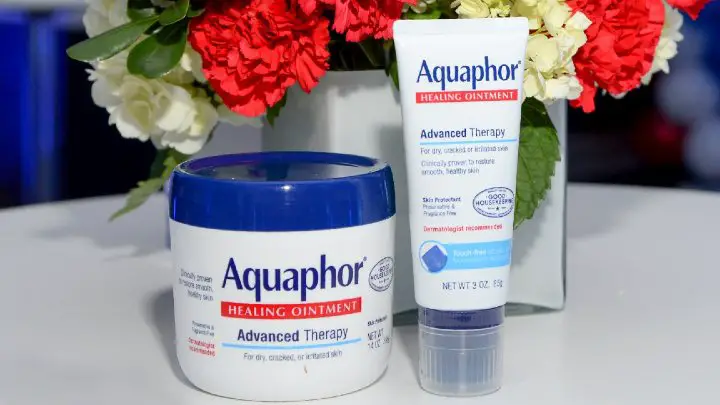If you’re reading this article, you’ve probably heard that using Aquaphor on piercings can help them heal quickly and prevent infection.
But is this true? The answer is no. Aquaphor can do you more harm than good when it comes to piercings.
Read on to know why Aquaphor is not a good idea for piercings, what to use on piercings to make them heal quickly and what not to use.
Why should you not put Aquaphor on piercings?

There are a few reasons why you shouldn’t put Aquaphor on piercings.
- Aquaphor contains petroleum jelly, which can create a barrier that traps bacteria and dirt around the piercing. This can make your piercing more susceptible to bacterial infection.
- Aquaphor can delay the healing process of a new piercing. That is because the ointment creates a barrier that prevents oxygen from reaching the piercing, which is necessary for healing.
- Aquaphor can cause the jewelry to loosen, which can lead to irritation and inflammation around the piercing.
So if you’re looking for something to help heal your new piercing, Aquaphor is not a good option. There are several other ways to heal piercings, which I’ll mention below.
SEE: Does Aquaphor Expire Or Go Bad?
What heals piercings quickly?
Saline solution
If you’re looking for a quick and easy way to heal your piercing, saline solution is the way to go. Saline solution is a mixture of salt and water that you can buy at most pharmacies or online.
To use it, soak a cotton ball in the solution and apply it to your nose piercing for 5-10 minutes. Rinse the area with clean water afterward. Repeat this process 2-3 times a day until your piercing heals.
Soap and water
Another great way to keep your piercing clean and infection-free are to wash it with soap and water. This simple method is gentle enough for new piercings, yet effective at preventing bacteria from growing.
Soap and water also help to speed up the healing process and prevent inflammation by keeping the area clean. Be sure to use a mild soap and wash your piercing twice a day, taking care not to scrub too hard or irritate the skin.
SEE: These Are The Best Handmade Soaps Made From Organic Materials
H20cean
If you have a piercing that’s healing slowly or you want to prevent infection, you can use H20cean to speed up the healing process. Simply apply a small amount of H20cean to the piercing twice a day, and it will help to kill any bacteria that may be present.
Emu oil
If the above options are not for you, then give emu oil a try. Emu oil has many benefits for piercings, including reducing inflammation and promoting healing.
To use emu oil on your nose piercing, simply apply a small amount to a cotton ball or Q-tip and apply it to the piercing twice a day. You should see a noticeable difference in the healing time of your piercing within a few days.
SEE: Different Types of Ear Piercings To Make You Look Chic
What should you not put on piercings?
Rubbing alcohol
Rubbing alcohol is a harsh antiseptic that can cause piercings to become irritated and inflamed. In some cases, it can even lead to infection and damage the skin tissue.
Witch hazel
Witch hazel is an astringent, which means it shrinks and constricts body tissue. This can be helpful if you have a cut or scrape that you want to heal quickly. But when it comes to piercings, witch hazel can damage delicate tissue and slow down the healing process.
Hydrogen peroxide
While hydrogen peroxide can kill bacteria, it is also a very harsh chemical that can irritate your skin and damage your piercing. If you have a piercing, it’s best to avoid using hydrogen peroxide or any other products that contain it.
Petroleum-based products
Avoid using petroleum-based products such as Vaseline and Neosporin, because they can trap bacteria and dirt in your piercing. They can also delay healing and in some cases, they can cause irritation and inflammation.
SEE: Discover the Benefits and Uses of Petroleum Jelly For Skin
Gly-Oxide
Gly-Oxide is a product that people often use to cleanse mouth sores, gum irritations, and oral piercings. However, it contains carbamide peroxide, which can damage piercings.
When used on a piercing, Gly-Oxide can cause the jewelry to become loose and fall out. It can also irritate the skin around the piercing and lead to infection.
Frequently Asked Questions

Why do piercings get infected?
Piercings get infected because they are constantly rubbing up against clothes, sheets, and our own hands.
These can introduce bacteria to the piercing, causing it to get infected. It’s also worth noting that if you don’t clean your jewelry regularly, it can harbor bacteria and cause an infection.
Should you keep your piercing wet or dry?
Keep it dry.
Water can introduce bacteria into the piercing, which can cause infection. If you must get your piercing wet, be sure to use clean, distilled water and pat dry with a clean towel afterward.
Is Aquaphor petroleum jelly?
No, it is not.
Aquaphor is an ointment that contains petroleum jelly and other ingredients like lanolin, panthenol, and mineral oil. You can find this ointment at most drugstores; it is relatively inexpensive.
Should you leave the crust on your piercing?
Yes, you should.
If you’ve just had your piercing done, it’s important to leave the crust on your piercing. This crust is called a scab, and it’s your body’s way of healing the wound. The scab will protect the piercing from infection and help it heal.
If you try to remove the crust on your piercing, you could end up damaging the piercing or causing an infection. So, it’s best to just leave it be and let your body do its thing. Don’t worry- the scab will eventually fall off on its own.
What’s the easiest piercing to heal?
Earlobe piercing is the easiest piercing to heal.
This is because the earlobe is made up of soft tissue, which means it heals quickly and doesn’t require as much care as other types of piercings (like those in the navel).
Also, earlobes don’t get infected as easily as other parts of the body because they’re not exposed to as much bacteria. So, if you’re looking for a piercing that won’t take too long to heal and won’t require a lot of care, an earlobe piercing is the way to go.
Conclusion
Aquaphor is a petroleum-based product that can irritate your piercing and cause an infection. It can also inflame the piercing site and cause it to heal slowly by preventing oxygen from reaching the wound.
So if you want your new piercing to heal, it’s important to stay away from Aquaphor. You should also stay away from other petroleum-based products and harsh products, such as rubbing alcohol, witch hazel, hydrogen peroxide, and Gly-Oxide.
A simple saline solution or soap and water is usually the best way to clean and heal a piercing. You can also use other safe and effective remedies like H20cean and emu oil.
Thanks for reading.
For more information on how to care for new piercings, visit Africana Fashion today.







